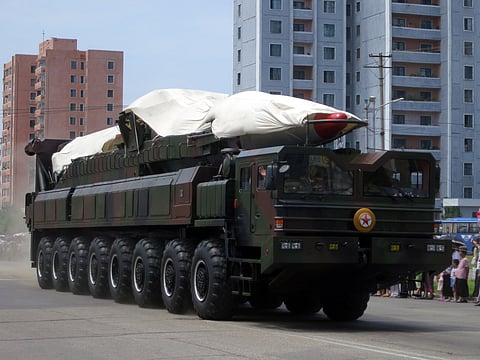

North Korea fired approximately 10 rockets into the Yellow Sea on Thursday in what analysts view as a direct response to trilateral military drills conducted a day earlier by the United States, Japan, and South Korea.
According to South Korean military officials, the projectiles—believed to be launched from a multiple rocket launcher system—traveled tens of kilometers before landing in the Yellow Sea. The weapons are thought to be the same long-range artillery systems first unveiled by North Korea during military drills last November. These systems are capable of being deployed near the Demilitarized Zone (DMZ) and are reportedly able to strike the South Korean capital, Seoul, which lies just 35 miles (56 kilometers) from the DMZ.
The launches followed trilateral aerial military exercises held on Wednesday involving U.S., Japanese, and South Korean forces. The timing is notable as the drills coincided with the recent inauguration of South Korean President Lee Jae-myung, who has advocated for renewed intra-Korean dialogue and de-escalation of tensions on the peninsula. Lee, seen as a moderate, has expressed interest in reviving inter-Korean cooperation.
Earlier this year, North Korean leader Kim Jong Un condemned the U.S. deployment of nuclear-capable B-52 bombers to the peninsula, vowing to take "countermeasures" against what Pyongyang perceives as increasing regional threats. In response, North Korea has accelerated its weapons development.
Since signing a Treaty on Comprehensive Strategic Partnership with Russia in 2024, which includes a mutual defense clause, North Korea has reportedly received significant military-technical support from Moscow. Two newly built naval destroyers—the first domestically produced by North Korea—exhibit design features similar to Russian vessels. The regime has also unveiled new air-to-air missiles believed to be locally produced versions of Russian designs.
Despite rising tensions, there have been small but notable signs of de-escalation in recent weeks. Following Lee Jae-myung’s rise to power, both Koreas have reportedly agreed to halt the broadcasting of propaganda messages across the DMZ, a move seen as a gesture toward reducing hostilities.